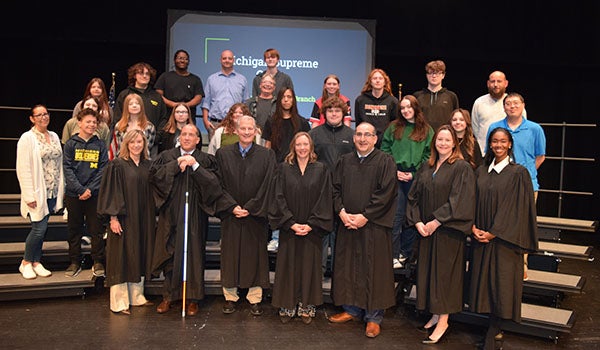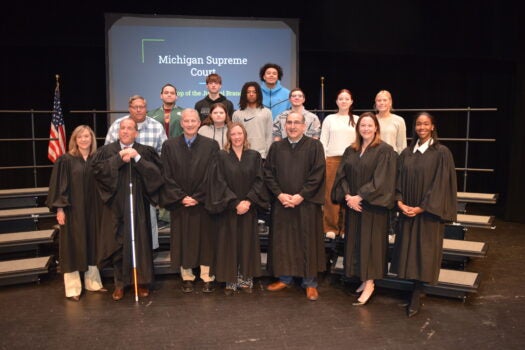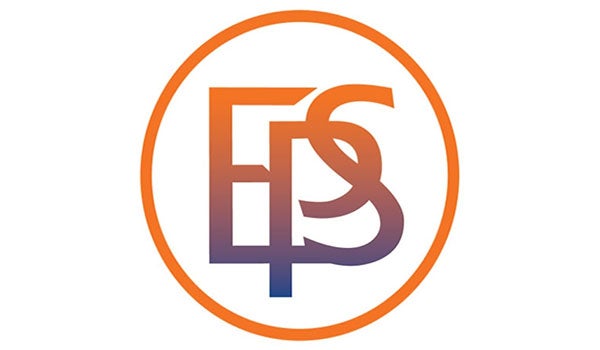Michigan Supreme Court hears case at SMC
Published 12:18 pm Thursday, April 25, 2024
|
Getting your Trinity Audio player ready...
|
DOWAGIAC — Area high school students had a unique opportunity Wednesday to witness oral arguments made before the Michigan Supreme Court. The morning event in the Dale Lyons Theatre at Southwestern Michigan College was part of the high court’s “Court Community Connections” program.
This was the 29th “Court Community Connections” program the high court has done at locations around the state since 2007 to educate high school students about how the courts work. The Michigan Supreme Court goes out on the road twice a year to give people the chance to hear oral arguments in person.
Students from several Berrien and Cass County high schools attended the event which featured oral arguments about a Livingston County case involving juvenile and weapon issues. After the oral arguments, students were able to ask questions of the lawyers and Supreme Court Commissioner Daniel Brubaker before posing for pictures with the justices.
Brubaker briefed students at the start on what they would see at the start of the program. He noted that the Michigan Supreme Court doesn’t have to take cases. They receive between 1,400 and 1,600 applications for leave to appeal each year and hear only about 80-typically those cases that could have a significant impact on the state residents.
The case being heard Wednesday proved to be an interesting one for the students and gave them a glimpse into how the court system operates. Livingston Assistant Prosecutor William Worden and defense attorney Kristina Dunne presented their arguments concerning a 2021 assault by two juveniles on a third juvenile.
The defendant in this case, Evan Andrew Oslund, also a juvenile, filmed the incident which was then sent out on social media. The victim was kicked and hit and suffered a minor concussion. All three juveniles were tried as adults with the other two pleading guilty to assault with intent to do great bodily harm and getting probation.
The Michigan Court of Appeals initially refused to hear Dunne’s appeal but later ruled against her client. The Michigan Supreme Court is now hearing the case and considering two main issues: whether shoes can be considered dangerous weapons and whether a motion to squash should have been granted and Oslund not waived to adult court.
Dunne argued that the lower courts had not followed state law in regard to waiving Oslund into adult court on an aiding and abetting the great bodily harm assault argument or in defining shoes as a dangerous weapon. She said the case should have been kept in juvenile court.
Worden acknowledged that the trial court didn’t completely consider all the issues involved with the adult court waiver and with the weapon definition and asked that the case be remanded back to the trial court to decide those issues. He said the case was the first of its kind brought by his county and said it came about due to the viral video and the fact the victim had special needs.
Michigan Supreme Court Chief Justice Elizabeth Clement noted that oral arguments like the ones heard Wednesday play an important role in the court’s decision making process. Justices also consider the briefs submitted as well as applicable law.
Eight Brandywine High School students were among those in attendance Wednesday who were glad they came.
“It was definitely eye opening to me to see how court proceedings go,” senior David Kline said. “The entire process was new to me, I hadn’t been exposed to something like this before. It’s definitely an experience I won’t forget, I learned a lot.”
“I thought it was pretty interesting,” junior Autumn Dopkowski said. “I hadn’t thought of all the things that could be considered weapons. You could get in trouble with anything you do.”
Numerous dignitaries were also on hand for the morning event in the Dale Lyons Theatre on the SMC Dowagiac campus. Judges and other officials from four Southwest Michigan counties attended the event as did Pokagon Band of the Potawatomi Chief Tribal Judge Michael Petoskey.
Judge Petoskey noted that the Pokagon Band and the 11 other federally recognized tribes in Michigan have been working with the state courts for 30 years to better serve tribal members and to help local and state courts better understand the concerns and needs of Native Americans.
The Michigan Supreme Court’s visit to Dowagiac was co-sponsored by the Pokagon Band who hosted a reception for the justices Tuesday evening. Tribal members formally opened Wednesday’s event with an honor song drum performance by the Ribbon Town Singers.








